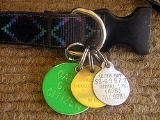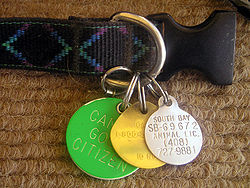
Dog licence
Encyclopedia

Dog
The domestic dog is a domesticated form of the gray wolf, a member of the Canidae family of the order Carnivora. The term is used for both feral and pet varieties. The dog may have been the first animal to be domesticated, and has been the most widely kept working, hunting, and companion animal in...
. Usually a dog-licence identifying number is issued to the owner, along with a dog tag
Dog tag
A pet ID tag, or pet tag is a small flat tag worn on pets' collars or harnesses.Humane societies and rescue organizations recommend that dogs and cats wear these tags, which contain information to enable someone encountering a stray animal to contact the owner.Some people object to pet id tags...
bearing the identifier and a contact number for the registering organization. If a stray pet is found with the tag, a rescuer can call the registering organization to get current contact information for the dog's owner.
Licensing a dog might require additional actions on the owner's part, such as ensuring that the dog has a current rabies
Rabies
Rabies is a viral disease that causes acute encephalitis in warm-blooded animals. It is zoonotic , most commonly by a bite from an infected animal. For a human, rabies is almost invariably fatal if post-exposure prophylaxis is not administered prior to the onset of severe symptoms...
vaccination
Vaccination
Vaccination is the administration of antigenic material to stimulate the immune system of an individual to develop adaptive immunity to a disease. Vaccines can prevent or ameliorate the effects of infection by many pathogens...
. In many jurisdictions a fee, which is usually small, must be paid. Licences typically must be renewed annually or after some small number of years.
Licensing information worldwide
Great BritainGreat Britain
Great Britain or Britain is an island situated to the northwest of Continental Europe. It is the ninth largest island in the world, and the largest European island, as well as the largest of the British Isles...
: Dog licensing was abolished in 1987. Prior to this dog licences were mandatory, but the requirement was widely ignored, with only about half of owners having one. The final rate for a dog licence was 37 pence, reduced from 37½p when the halfpenny
British Half Penny coin
The British decimal half penny was first issued on 15 February 1971, the day the British currency was decimalised. In practice it had been available from banks in bags for some weeks previously....
was withdrawn in 1984. This figure was an exact conversion from 7/6 (seven shilling
Shilling
The shilling is a unit of currency used in some current and former British Commonwealth countries. The word shilling comes from scilling, an accounting term that dates back to Anglo-Saxon times where it was deemed to be the value of a cow in Kent or a sheep elsewhere. The word is thought to derive...
s and sixpence
Sixpence
Sixpence may refer to:*Sixpence *Sixpence *Sixpence *Flat cap, also called a sixpence*Sixpence None the Richer, an American pop/rock band...
) on decimalization
Decimal Day
Decimal Day was the day the United Kingdom and Ireland decimalised their currencies.-Old system:Under the old currency of pounds, shillings and pence, the pound was made up of 240 pence , with 12 pence in a shilling and 20 shillings in a...
in 1971. The revenue went to local authorities.
Northern Ireland
Northern Ireland
Northern Ireland is one of the four countries of the United Kingdom. Situated in the north-east of the island of Ireland, it shares a border with the Republic of Ireland to the south and west...
: Dog licences are required under the Dogs (Northern Ireland) Order 1983. dog licences cost £12.50 a year, with reductions for pensioners and owners of neutered dogs.
Ireland
Republic of Ireland
Ireland , described as the Republic of Ireland , is a sovereign state in Europe occupying approximately five-sixths of the island of the same name. Its capital is Dublin. Ireland, which had a population of 4.58 million in 2011, is a constitutional republic governed as a parliamentary democracy,...
: Dog licences are required and cost €
Euro
The euro is the official currency of the eurozone: 17 of the 27 member states of the European Union. It is also the currency used by the Institutions of the European Union. The eurozone consists of Austria, Belgium, Cyprus, Estonia, Finland, France, Germany, Greece, Ireland, Italy, Luxembourg,...
12.70 / year, with a general licence allowing unlimited dogs on one premises at €253.94.
Germany
Germany
Germany , officially the Federal Republic of Germany , is a federal parliamentary republic in Europe. The country consists of 16 states while the capital and largest city is Berlin. Germany covers an area of 357,021 km2 and has a largely temperate seasonal climate...
: Dog ownership is regulated by a "dog tax" as opposed to a dog licence, with the amount due depending on the breed of the dog: dogs deemed "dangerous", such as Rottweiler
Rottweiler
The Rottweiler is a medium to large size breed of domestic dog that originated in Rottweil, Germany. The dogs were known as "Rottweil butchers' dogs" because they were used to herd livestock and pull carts laden with butchered meat and other products to market...
s, are subject to higher tax.
United States
United States
The United States of America is a federal constitutional republic comprising fifty states and a federal district...
: Most states, municipalities, or other jurisdictions require dog licences along with rabies vaccination, and the licence duration cannot exceed the time the vaccine is effective. As a way of preventing the overpopulation of animals
Overpopulation (animals)
The phenomenon of overpopulation in companion animals refers to the large number of homeless domestic cats and dogs. In the United States alone, between 3 and 4 million cats and dogs are euthanized each year because no one volunteers to adopt them...
, some jurisdictions charge a significantly lower licensing fee if the owner presents veterinary
Veterinarian
A veterinary physician, colloquially called a vet, shortened from veterinarian or veterinary surgeon , is a professional who treats disease, disorder and injury in animals....
proof that the dog has been spayed or neutered
Neutering
Neutering, from the Latin neuter , is the removal of an animal's reproductive organ, either all of it or a considerably large part. The process is often used in reference to males whereas spaying is often reserved for females. Colloquially, both terms are often referred to as fixing...
.
- California and Maryland also have some areas where catCatThe cat , also known as the domestic cat or housecat to distinguish it from other felids and felines, is a small, usually furry, domesticated, carnivorous mammal that is valued by humans for its companionship and for its ability to hunt vermin and household pests...
licences are required.
Canada
Canada
Canada is a North American country consisting of ten provinces and three territories. Located in the northern part of the continent, it extends from the Atlantic Ocean in the east to the Pacific Ocean in the west, and northward into the Arctic Ocean...
: Dog licences are required.
Australia
Australia
Australia , officially the Commonwealth of Australia, is a country in the Southern Hemisphere comprising the mainland of the Australian continent, the island of Tasmania, and numerous smaller islands in the Indian and Pacific Oceans. It is the world's sixth-largest country by total area...
: Dog licences are mandated by state and territory legislation but are issued by local governments (e.g., city or shire councils). Hence the cost of a licence and the format of the licence tag vary across the country. Some areas, such as Victoria, require cat registration and microchipping also.
New Zealand
New Zealand
New Zealand is an island country in the south-western Pacific Ocean comprising two main landmasses and numerous smaller islands. The country is situated some east of Australia across the Tasman Sea, and roughly south of the Pacific island nations of New Caledonia, Fiji, and Tonga...
: Under the Dog Control Act 1996 all dogs over 3 months old are required to be registered with the city or district council
Territorial authorities of New Zealand
Territorial authorities are the second tier of local government in New Zealand, below regional councils. There are 67 territorial authorities: 13 city councils, 53 district councils, and the Chatham Islands Council...
the dog usually resides in. As a prerequisite, all dogs classified as dangerous or menacing, and all dogs first registered in New Zealand after 1 July 2006 must be micro chipped before they can be registered.
- All dog registrations expire yearly on 30 June, and must be renewed by 31 July. Fees for registration differ between councils, and also differ according to factors such as whether the dog is neutered, living in an urban or rural area, classed as dangerous or menacing, and whether the owner is a responsible dog owner. Fees for working dogs (herding dogs, police dogs, drug dogs, etc.) are generally lower than for pets, and seeing-eye or hearing-ear dogs are generally free or minimal cost to register.
Isle of Man
Isle of Man
The Isle of Man , otherwise known simply as Mann , is a self-governing British Crown Dependency, located in the Irish Sea between the islands of Great Britain and Ireland, within the British Isles. The head of state is Queen Elizabeth II, who holds the title of Lord of Mann. The Lord of Mann is...
: Dog licences are required.

